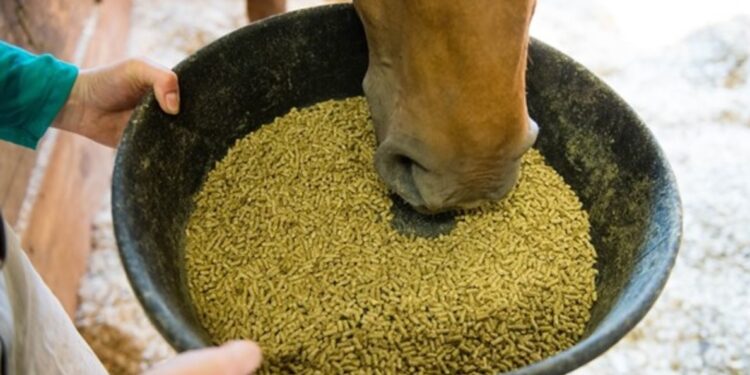Packed with trace elements, minerals, and vitamins, mineral feed is the ideal supplement to basic feed. Regardless of whether your horse is young, old, pregnant, or particularly challenged – the right mineral feed for horses makes it much easier for you to supply nutrients.
What does mineral feed for horses contain? Usual ingredients
What is a good mineral feed made of? It should usually contain essential vitamins, minerals, and trace elements for your horse. In the thicket of the huge selection, however, you have to consider a few things when buying.
For example, it is important that the nutrients contained are as natural as possible. They are then in their natural form and easily absorbable by the horse’s body. Bioavailability is high. Synthetically manufactured counterparts are often received much less well.
Furthermore, the mineral feed for horses should not contain any unnecessary additives. These include, for example, flavor enhancers and artificial flavors. The good feed should not contain too much oil either.
Roughly divided, the following components can be found in mineral feed for horses
- minerals
- trace elements
- vitamins
The former include, for example, calcium, magnesium, phosphorus, and potassium. They are essential for a healthy metabolism and are required in large quantities by the horse’s body.
After all, vitamins are needed in fat- and water-soluble forms. The B vitamins are particularly important. Among other things, they ensure a beautiful coat and firm hooves. Vitamins A, K, E, and D – all fat-soluble – are also of outstanding importance.
Which mineral feed is right for your horse?

Choosing the right mineral feed is not always easy. The selection of products is now almost endless, each of which promises optimal nutrient supply. For example, there is special feed for old, young, pregnant, or sick horses. No matter how your horse is doing at the moment – there is certainly already a suitable feed on the market.
However, the manufacturers of various mineral feed for horses tend to overestimate the mineral requirements of your four-legged companion. Of course, all important nutrients must be supplied – but with a high-quality basic diet, adding mineral feed is often not necessary for horses.
This is especially true for horses that eat a lot of rich roughage. This includes, for example, hay. This also contains plenty of vitamins and minerals, which often cover the daily requirement.
Does your horse also graze in the lush green all day long? Great, then it will probably not need any additional mineral feed but will be well taken care of. It is important that high-quality hay and grass contain a lot of nutrients. Since there are increasingly nutrient-poor soils, plants also contain fewer important minerals.
The following aspects should be considered when choosing a suitable mineral feed
- age
- horse breed
- performance requirements
- basic nutrition
- circumstances of the posture
What role does horse breed play in selecting a mineral feed?
The breed can certainly play a role in the search for suitable mineral feed for horses. In fact, some breeds have distinct nutritional needs. For example, Friesians, Tinkers, and Icelanders need more trace elements and vitamins that support a shiny, dense coat. These include biotin, zinc, copper, manganese, and B vitamins.
Horse breeds that develop a lot of muscle mass, on the other hand, need more electrolytes such as magnesium. Not every feed recommendation can therefore be applied to all horses. If your horse belongs to a special breed, special treatment may well be appropriate.
Read More: Soybean meal for a horse
Which horses need mineral feed?

But who really needs mineral feed? The following groups should be considered separately when selecting a suitable mineral feed for horses:
- Foals and young growing horses
- old horses (senior horses)
- pregnant mares
- sport horses
- sick horses
- Horses with previous illnesses or metabolic disorders
Foals and young horses, for example, have an increased need for vitamins and minerals. Corresponding products are therefore characterized by a high content of these. Pregnant mares also have special needs and can be optimally supported with a well-chosen mineral feed.
FAQ
When does a horse need mineral feed?
A horse needs mineral feed when it no longer takes in enough minerals, vitamins, and trace elements from its roughage consumption. This can be the case, for example, with poor-quality forage that comes from nutrient-poor soils. Horses whose basic feed is of high quality usually do not need any additional mineral feed.
Certain life phases are an exception here. The need for nutrients is increased in foals, young horses, and pregnant mares. This often also applies to senior horses, even if it cannot be determined in general here.
Furthermore, horses that are required to perform well – for example, competition and draft horses – need more vital substances than others.
In all cases, you should make sure that you don’t just blindly feed mineral feed, but rather orientate yourself towards actual needs.
How much mineral feed does a horse need per day?
In order to find out how much mineral feed your horse really needs, it is advisable to analyze the basic feed. This is the only way to find out how well your horse is already being supplied with nutrients. The bear part of the diet should be covered with basic feed – for example, hay.
Incidentally, the need for this is not exactly low. For every 100 kg of weight, your horse must be given 1.5 kg – 2 kg of roughage per day. The mineral feed should only act as a supplement. For an exact determination of the dosage, follow the manufacturer’s instructions or speak to your veterinarian.




